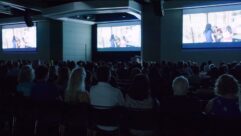
Management Perspectives: Church Tech Training
Jan 1, 2005 12:00 PM,
By Gary Zandstra
Successful integration of technology into worship services depends on user training.
Click here to read more Management Perspectives columns

One of the most discussed topics in the industry of church AV is training. Integrators are installing more sophisticated and complex systems as many churches are incorporating AV and production into their weekly services. Churches spending big dollars on these installs expect big results. The problems arise as volunteers with little or no training try to operate these highly technical systems.
WHOSE PROBLEM IS IT?
The technical advancements in the church market over the last 20 years have been astounding. The average church has gone from a six- to eight-channel mixer to 32 channels and from maybe one wireless lavalier mic to systems of eight or more. The most profound change that has driven this has been the move from the simple piano, organ, and single “minister of music” style of worship to contemporary worship.
Today at a typical worship service, it is common to find a team consisting of a worship leader, four or more vocalists, guitars (electric, acoustic, and bass), keyboards, piano, and drums. Sometimes a flute player, a violinist, or even a brass section are included. Now add in the dramatic productions with four to five actors and numerous sound effects. At times, church looks and feels like a cross between Broadway, a touring concert, and a motivational seminar. I am not going to go into a dialogue as to what is proper and appropriate; that is for each congregation to decide. The point is that in 20 short years the church now has an expectation placed on it to provide excellent, preplanned, relevant, entertaining, and uplifting programming.
The AV industry has not necessarily had a great track record of training the user. In fact, it does not even have a great track record of training its own people. Up until recent years, with the attempt at Nicet certification and now C-EST training, the industry was primarily made up of home-grown, self-taught personnel. I would even argue that it is still that way, since many integrators do not take advantage of the training offered by industry associations like the National Systems Contractors Association. In addition, the integrators installing systems into churches that are updating their technology often have no experience in the demands of a production-oriented church service.
A friend of mine who has been a worship leader at churches that are very production-oriented noted that mixing for church is not like mixing for a two-hour rock concert. You have a worship team, band, sometimes orchestra, the spoken word, video elements, lots of transitions, drama, loud moments, quiet moments, even silence, and then to top it off you have unpaid volunteers who are the talent on the stage. I would add that in most cases you also have an unpaid volunteer at the mix position.
I find it astounding that a church has no problem investing $250,000 — sometimes over $500,000 — on AV systems for sound, theatrical lighting, and video, but usually does not even consider hiring someone to run and maintain it. Every church I have worked with has had a least one paid music person on staff. Often there was a whole department that included worship leaders, orchestra directors, choir directors, and producers. Yet many of these churches that pride themselves on the quality of their music and production can’t find enough money in their budget to hire a qualified person to pull it all together.
HOW CAN IT BE SOLVED?
It can be easy to sit back and point out a problem, but it gets a bit more difficult when you have to put together a solution to the problem. Before finding a solution, one can ask a plethora of questions, including:
- Why are the Christian colleges and music schools not offering degrees in technical ministry?
- Why are there not more vocational schools that offer training?
- Why does the AV industry not offer user training?
- Why is there not a training school like the recording industry has?
The technical knowledge deficit that exists today is a result of many factors. First, there’s the rapidness with which the church has adopted technology and the ignorance or misunderstanding of what it requires to operate and maintain technical systems. Also playing a part is the failure of integrators that have sold systems to provide adequate user training.
The high turnover rates among church volunteers also affect production, because in many cases an operator who was trained is no longer involved and passed incorrect or confusing information on to others, if anything. Another factor is the reluctance of the church’s “experts” — the people who work for the cable TV company as installers so therefore consider themselves authorities on church sound — to seek training or input from qualified individuals.
I have come to the cynical conclusion that most churches are controlled by the church secretary, custodian, and/or sound operator. For some reason, a majority of churches seem to let this select group of individuals dictate church policy and decision-making.
WHAT IS NEEDED TO FILL THE GAP?
First of all, churches must take responsibility and be willing to fund training resources. This could include hosting seminars, paying experts to come onsite to do training, paying for church technicians to go to seminars, and purchasing books and materials that are relevant. This is common sense. Would you buy a car if you did not know how to drive? So why do so many churches purchase technical systems with no clue how to operate them?
Secondly, system integrators need to step in and provide comprehensive training. If the integrator is qualified to install the system, then the integrator should be responsible for training users for the system. In my opinion, an integrator in a design/build scenario who provides proper training to the user should offer at least a one-year, no-fault warranty on a system. Barring the proverbial “act of God,” there should be no labor or equipment charge to remedy any problem that arises, even if it is operator error. After all, it was the integrator who trained the user.
Thirdly, the industry and its associations should seek avenues to provide user education and training. An educated user makes wiser choices in selecting integrators and equipment, resulting in better installations. In addition, a trained user would serve to raise the overall sound quality and consistency that the general public experiences.
WHO IS GOING TO TAKE THE LEAD?
We all like to point out problems, but who is going to step up and offer solutions? Perhaps it will come through the church. Networks of churches, whether denominations or affiliations based on style, are already in existence. It may be that groups will form and churches will train other churches.
Maybe the industry will formulate sanctioned user training through one of the associations, like the C-EST training offered to installers. Most likely, a passion-driven integrator of the local mega church or a technical director will develop a curriculum that is web based or video based that will serve to educate system operators.
The well-known saying “it’s the service after the sale” that matters applies well here. It is time for the integrator and the industry to stand up and service the daylights out of the customer!
Gary Zandstraserves as Sales and Marketing Manager for Parkway Electric & Communications in Holland, Mich. He can be reached at[email protected].










